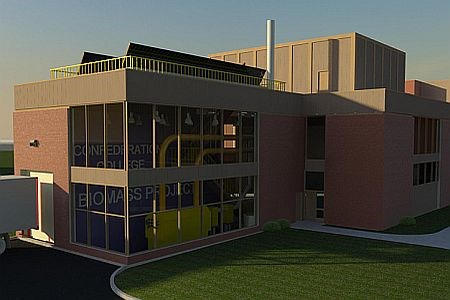Thunder Bay's Confederation College is taking their partnership with global energy experts Honeywell to another level with plans for a biomass wood-fire boiler.
The proposed $5 million plant would replace older, less-efficient electric heating system in the college's main Shuniah building.
Confederation is following through on a next stage in its multi-million green plan, called Integrated Renewable Solutions, to make the college 'carbon neutral.'
The proposed 1,259 kilowatt hot-water boiler will displace more than 80 per cent of existing natural gas-fired boilers that heat the building. The 2,000-square-foot biomass plant will be located next to the Shuniah and tie into systems at an existing boiler house.
The plan is to fed the boiler with locally-sourced untreated, chipped wood waste from area sawmills and from brush cut by City of Thunder Bay contractors.
The operation will take a maximum of 15 green metric tonnes of biomass per day and 1,900 tonnes per year.
Confederation vice-president of corporate services, Bob Backstrom, said the college is talking with local AbitibiBowater officials about securing some of their biomass waste. As a relatively small consumer of wood waste, it shouldn't interfere with the Ontario government's biomass procurement call to access an estimated 5-million-cubic metres of unused forest slash in the province.
We would be incidental to whatever else other people would be looking at."
The college's partnership with Honeywell is a long-standing relationship. The pair have collaboration in energy retrofits at the Thunder Bay and Kenora campuses on various lighting and heating/cooling retrofits for more than 30 years.
In the sustainability area they have a lot of knowledge, said Backstrom.
Honeywell is assisting with their worldwide expertise in building similar plants in Europe.
The type of boiler being investigated and examined by Confederation faculty is a European design used at some sites in northwestern Ontario. Backstrom hopes a local manufacturer may get the licence to produce it in Thunder Bay.
The plant building is being designed to include a number of 'green' energy efficient features.
A solar thermal wall which will pre-heat outside air will feed the boiler. Roof-mounted solar photovoltaic collectors will meet electrical needs for the building and floor-to-ceiling windows will provide natural daylighting to further cut power costs.
The building will be topped by a green roof to grown vegetables, reduce heating and cooling costs, and collect storm water run-off.
Emissions from the operation would be minimal. Though a stack will be erected, experts at the Ministry of Environment (MOE) have told the college they do not anticipate any problems with particulate or noise.
Any air emissions from the boiler would be below permissible levels set by the MOE.
Ash from the operation will be collected and used for agricultural lands, or a landfill as an alternative. The operation is expected to generate 0.15-tonne-per day during peak periods and 16-tonnes-per year.
It's estimated the plant will reduce the college's utility carbon footprint by 35 per cent with a carbon reduction of 1,433 tonnes. Though plans are still on the drawing board, college officials are considering up-sizing the furnace capacity specifications prior to going out for tenders this fall.
College officials are considering using biomass to heat the proposed 40,000-square-foot Regional Education Alliance for Community Health (REACH) Centre.
"We want to build this with a learning and research component, we don't want to build this as strictly functional facility,\'81\'68 said Backstrom.
Stationary engineering students could be trained to operate the boiler.
"This will give them a green side to their qualifications, said Backstrom.
There would also opportunities and physical space for outside vendors and manufacturers to use the facility as a testing facility for related technology.
The boiler would also serve as a demonstration unit for Northern communities to come and tour.
Funding for the project still needs to be obtained and college officials hope to tap into various government energy programs.
Honeywell have "guaranteed" the plant will be economical to run and should pay for itself within nine years.
www.confederationc.on.ca
https://buildingsolutions.honeywell.com




